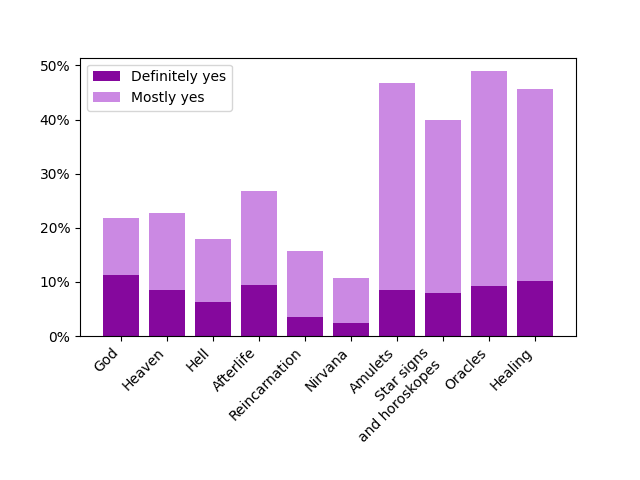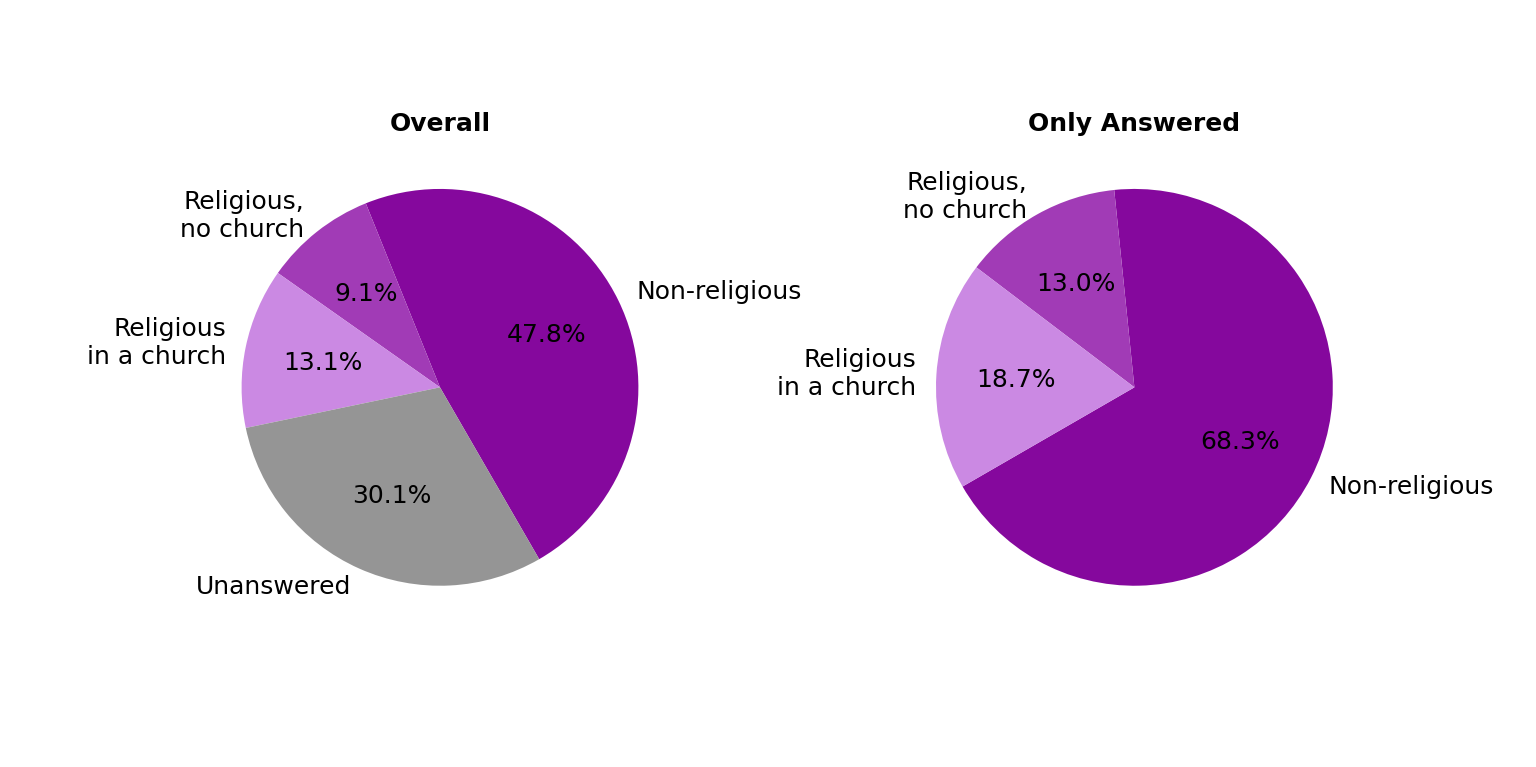When I asked religionist doc. Zdeněk Vojtíšek, prior to writing this article, whether there is any comprehensive research on religiosity in Czechia, he did not know about any that is high quality and recent. I have therefore compiled this article from numerous fragmented surveys carried out in the past, and added statements by experts in the field.
Eurobarometer (2005)
The statement that Czechia is the most atheist country (in Europe) is supported e.g. by the results of the 2005 Eurobarometer survey, according to which 19% of the population believes in god.[1] It was the second lowest result following Estonia (16%).[2] Let us not immediately assume that 81% of Czechs were atheist in 2005, however. If we look at the next number in the same graph, we can see that the situation around faith was not quite so simple even back then. Apart from “I believe there is a God”, there is also the option “I believe there is some sort of spirit or life force“. 50% of respondents chose this option at the time. For completeness – belief in neither a god nor any other higher power was expressed by 30% of respondents.
In a 2008 interview for ČT24, prof. Zdeněk R. Nešpor reminds us that there is a certain “distance from or distaste for churches” present in Czech society. He also notes that “if researchers asked how many people believe in horoscopes or amulets at least a little bit, we would find that the differences across Europe are much smaller”.[3] This is consistent with the Eurobarometer results.
Hamplová, Řeháková (2009)
The same year that Nešpor spoke about comparing belief in horoscopes, ISSP research[4] on Czechs’ belief in various supernatural phenomena was conveniently carried out. It asked not only about belief in God and Christian phenomena, but also horoscopes, amulets, reincarnation and other such things. In the following year (2009), a publication by Dana Hamplová and Blanka Řeháková called Česká religiozita na počátku 3. tisíciletí (Czech Religiosity at the Beginning of the Third Millennium)[5] was published. This publication set out to interpret the ISSP research and compare it to other research. In the chapter Čemu Češi věří (What Czechs Believe), Hamplová shows interesting data which, despite their age, illuminate the current situation quite well. The data show that belief in God and Christian phenomena (heaven, hell, the afterlife) is fairly weak or at least in the minority (definitely yes+mostly yes %: God – 11.3+10.5; heaven – 8.5+14.3; hell – 6.4+11.7; the afterlife – 9.5+17.3). Perhaps surprisingly, this is the case also for the supernatural originating in eastern religions – reincarnation (3.6+12.1%) and nirvana (2.4+8.4%). Stronger support (even if more so of the “mostly yes” kind) was, however, found for phenomena of alternative spirituality – amulets (8.5+38.3%), star signs and horoscopes (8.0+31.9%), oracles (9.3+39.7%) and healers (10.1+35.6 %). From this we can clearly see that these elements were (and continue to be) strongly present in our society and that we cannot exactly talk about ourselves as a nation of atheists. These data are also supplemented with the discovery that women are much more religious than men and that older people (age 60+) are much more religious than young people (age 18-35) (with the exception of amulets and nirvana – in these cases, young and older people are comparable). We will share one more interesting piece of information from the above mentioned publication, that is according to the 2008 ISSP results, a large number of people do not consider aspects of alternative spirituality to be religion.
2021 Census
In order to, in the year 2023, cite some sources newer than form the 2000s, let us move our attention to the census carried out in 2021. Originally, a question about religion was not going to be included at all, but a year before the census itself, it was added back in on the basis of an amendment proposal from March 5th 2020[6], albeit in an altered form (as compared to previous censuses). This has allowed us to draw from the relevant data here.
If we open the Sčítání 2021 – Náboženská víra (2021 Census – Religious Belief) page[7], we will first see a text which translates to the following: “In the question about religious belief, 18.7% of those who answered declared themselves to be religious and belonging to a church or religious community. The answer without religious faith made up more than two thirds (68.3%) of all answers. The question about religious belief was optional, it was left unanswered by 30.1% of people, in the 2011 census, this number was 44.7%.” In the graph below, we see that the question was answered by about 7,361,000 citizens. The first two percent figures are calculated from this base (expressed in actual numbers, this comes out to approximately 1,377,000 people in a church or religious community and 5,027,000 non-religious citizens). We can deduce using simple math that there are 13% of people (out of the ones who answered) who are religious and not declaring themselves as members of a church or religious community, exactly 960,201 citizens according to the table below. The remaining 3,163,000 citizens did not answer the question, and their belief (or lack thereof) subsequently became the subject of debate (see below).
From this, we could draw the simple conclusion that “more than 5 million Czech citizens are non-believers”. As was pointed out by religionist doc. Zdeněk Vojtíšek, however, things may not be quite so simple. He says: “It is unclear what percentages in this category are made up of atheists, agnostics, the religiously indifferent and citizens who do participate in religious practice, but refuse to be in any way associated with terms like religion or faith/faithful (who would most likely be considered as participating in so-called non-religious spirituality by religionists).”[8] Considering the third of the population which did not specify their (non-)belief, and the questions around the non-believing half, any conclusions drawn from these data can only be rough and must be taken with some reservation. What we can see clearly, however, are increases and decreases in the numbers of believers in individual churches, religious communities and faiths as compared to previous censuses.
The web portal of the 2021 census offers a look at a detailed table of results from this survey only. The religionist magazine Dingir, citing the Czech Statistics Bureau, shows us in its 2, 2022 issue (25th year)[9] a table containing all religious groups and churches and their membership numbers in censuses from 1991 to 2021. We recommend having a look at at least one of these tables. This way, we can glean a nice overview of the religious groups operating in this country (and there are many such groups) and their memberships. For demonstration, let us focus on only the “classic” ones. The Roman Catholic Church (the largest Christian church in this country), the Evangelical Church of Czech Brethren and the Czechoslovak Hussite Church have seen a significant and long term drop in membership. On the other hand, the Orthodox Church doubled its numbers between the last two censuses. Judaism and Islam also gained people in this time frame. In any case, we observe a long term drop in membership of churches and religious communities at large, and at the same time an increase in the number of religious people who do not claim membership of such organizations.
Conclusion
In conclusion, we could say that the situation in Czechia is in some ways unique, but we are definitely not a country of atheists. We observe the same increase in popularity of non-religious and alternative spirituality that we see elsewhere in the world. Unfortunately, for us to be able to properly grasp the situation, rather than just wave our hands around some numbers, we would need more up-to-date and properly collected data. We certainly must not ignore the 5 million people of no religious faith, however. In our opinion, it would be beneficial to get in contact with and explore this group, and to find out whether doc. Vojtíšek’s comment on the ambiguity of actual (non-)religious practice in this group holds any water.
[1] Eurobarometer: Social Values, Science and Technology, 2005, page 9, available at: https://europa.eu/eurobarometer/surveys/detail/448
[2] See footnote [1]
[3] Archive of ČT24: Češi, národ ateistů, 26. 8. 2008, available at: https://ct24.ceskatelevize.cz/archiv/1443826-cesi-narod-ateistu
[4] International Social Survey Programme, Religion III., 2008, available at: https://www.gesis.org/en/issp/modules/issp-modules-by-topic/religion/2008
[5] Česká religiozita na počátku 3. tisíciletí, Hamplová a Řeháková, 2009, available at: https://www.soc.cas.cz/publikace/cemu-cesi-veri
[6] Chamber of Deputies of the Czech Republic: Sněmovní tisk 622/4, Pozměňovací a jiné návrhy k tisku 622/0, 5.3.2020, available at: https://www.psp.cz/sqw/text/tiskt.sqw?o=8&ct=622&ct1=4
[7] Here: https://www.scitani.cz/nabozenska-vira#skupina-54318
[8] Dingir, vol. 2, June 2022 (25th year): Žádné velké změny, Zdeněk Vojtíšek, page 43
[9] See footnote [8]

